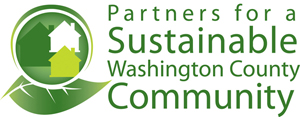 Sustainability for Washington County Sustainability for Washington County
By Bruce Bartlett
In January 2007 a community summit on sustainability was convened at the Public Services building in Hillsboro to explore what would be involved in making Washington County more sustainable. At the summit a consensus was reached recognizing the need to coordinate sustainability efforts across Washington County. On September 2008, five city governments, five special districts and Washington County signed an intergovernmental agreement to create Partners for a Sustainable Washington County Community (PSWCC: pswcc.org). In May 2009 the agency hired its first coordinator and started programming.
The coalition currently consists of the County, the cities of Banks, Beaverton, Cornelius, Hillsboro, and Tualatin, as well as Clean Water Services, Portland Community College (PCC) Rock Creek, Tualatin Hills Parks and Recreation District (THPRD), Tualatin Valley Fire and Rescue (TVF&R), and Tualatin Valley Water District (TVWD). Other cities are considering joining the group.
The agency researches sustainable practices, facilitates collaboration between partner organizations, and develops sustainability education and training for the partners and the Washington County community at large. It is currently focused on improving the internal operations of its partners. Projects include:
-
sustainability benchmarking and reporting
-
energy efficiency assessments and improvements
-
research and knowledge-sharing on best practices
-
internal training and education
The group holds monthly meetings that are open to the public. The subject of the January meeting was the county’s energy future. Jason Eisdorfer from the Bonneville Power Administration (BPA) and Rueben Plantico from Portland General Electric (PGE) outlined their organizations’ roles in providing electrical energy to our region of the state. They each provided their views on the short, medium and long-term energy prospects for us.
BPA is working based on the prediction that by 2020 there will be about a 10% decline in hydro-generated electricity due to climate change as there has been a 2%-per-decade decline in snow packs over many decades. Their challenges are to integrate wind-generated power into the grid, to expand transmission lines and, critically, increase overall efficiency. The BPA is internationally known for their conservation measures and anticipate that they will meet the needs of 85% of future growth in demand through conservation.
PGE showed their analysis of the sustainability factors that must be considered to continue to meet demand. They define “sustainability” as taking a long-term approach to business planning and decision making which balances economic, social and environmental concerns. Their service area has over 800,000 customers containing 43% of the state’s population—which provides over 70% of the state’s economic output. They are on course to increase electricity generated from renewable sources from 9% today to 25% by 2025. For four years in a row PGE has been the leading utility in the nation in the sale of energy from renewable sources.
As an example of the projects the PWSCC is sponsoring, in late 2009 they co-hosted “Choices for Sustainable Living” with the City of Hillsboro. The free five-week discussion course, designed by the Northwest Earth Institute, brought people together to explore the meaning of sustainability and the ties between healthy ecology, diet, consumer choices, community, economic growth, and the future.
The next meeting of the PWSCC will be on April 28 where the topic will be "A Sustainable Economy: Is Local Finance, Manufacturing and Consumption the Way to Go?" David Williams, President of ShoreBank Pacific, and Carsten Henningsen, founder of Portfolio 21 Investments, will talk about socially responsible investing, living economy models, microfinance, and mission-driven businesses.
|
